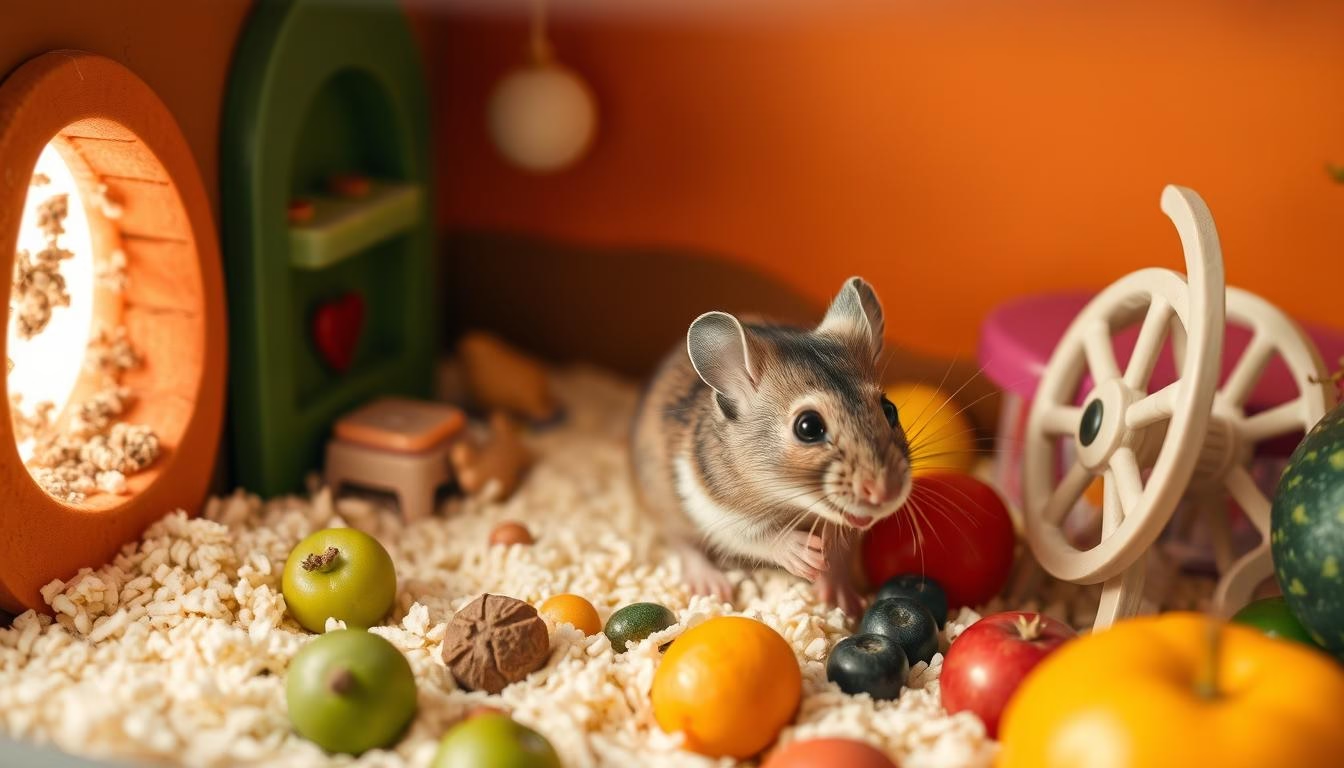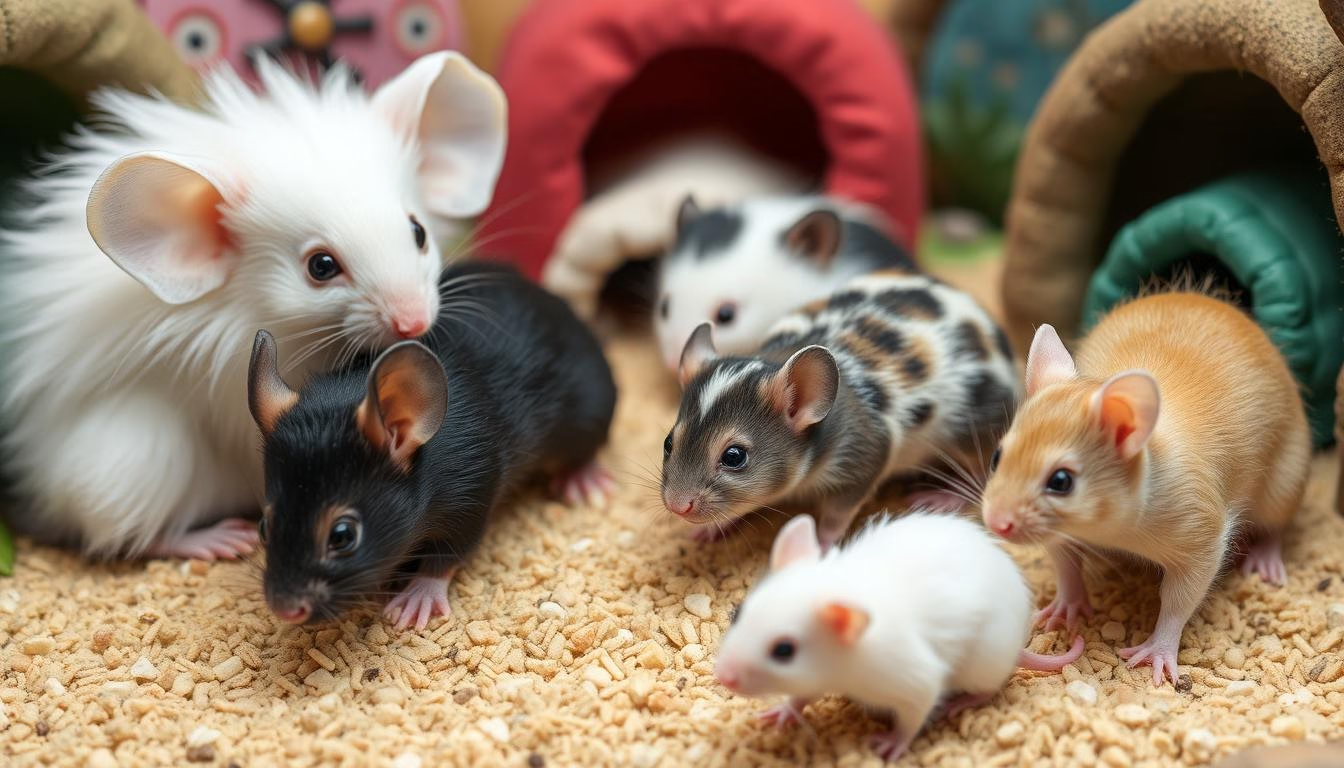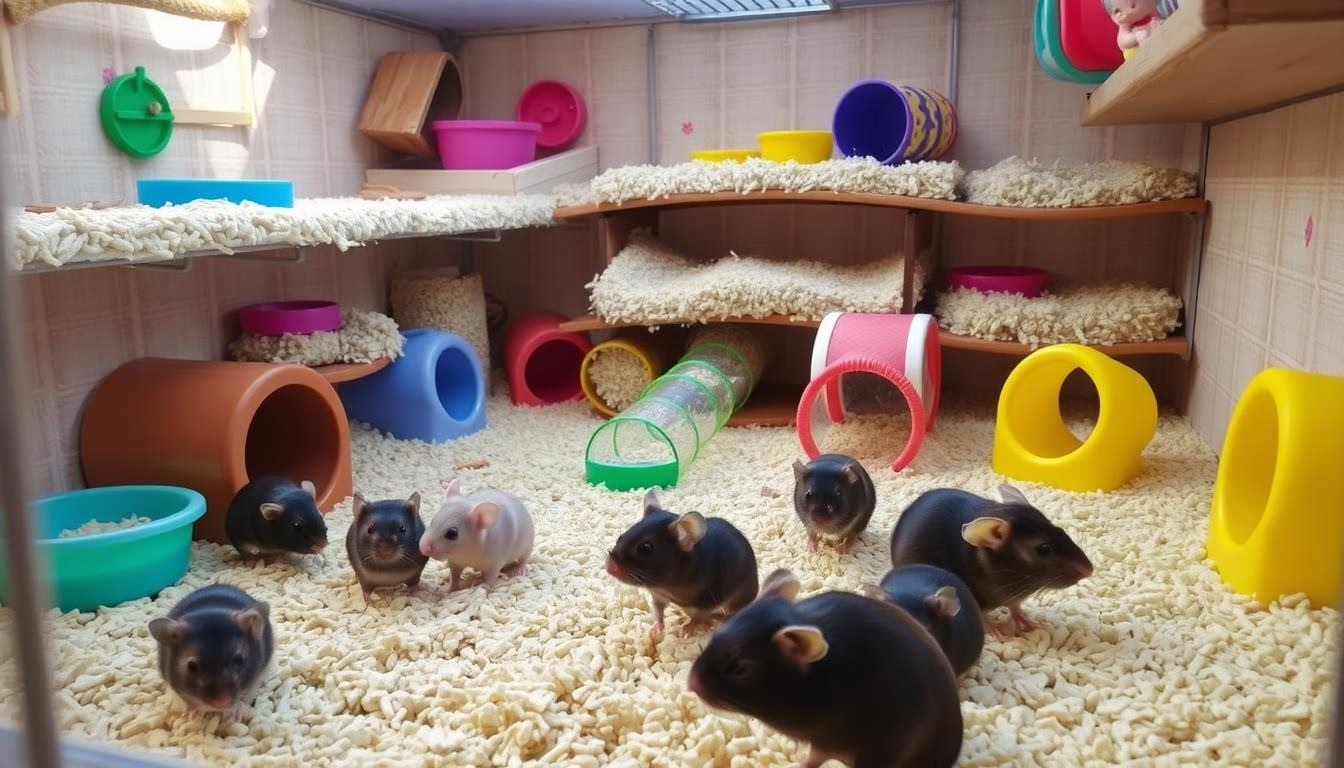Mice are a favorite among pet owners, especially for those with little space or who want a low-care pet. These small rodents might not be the first choice for a pet, but they can be wonderful additions to a home. Knowing the good and bad of having mice as pets can help you decide if they’re right for you.
Key Takeaways
- Mice are generally low-maintenance pets that require minimal space and care.
- They can be affectionate and social when properly socialized, making them engaging companions.
- However, mice have a relatively short lifespan and may require specialized housing and dietary needs.
- Potential health and odor concerns should be considered when keeping mice as pets.
- Providing a comfortable and enriching habitat is crucial for the well-being of pet mice.
Understanding Mice as Pets
Thinking about mice as pets? It’s key to know the various mouse types and their life spans. This info helps you decide if it’s the right choice for you.
What Types of Mice Are Commonly Kept as Pets?
Fancy Mice are the top picks for pets. They come in many colors and patterns, like agouti, black, and white. These mice are friendly and social, great for families and singles.
The Lifespan of Pet Mice
Pet mice usually live between 1.5 to 3 years. Their diet, exercise, and genes play big roles in their life span. Knowing this helps you prepare for the emotional side of losing a pet.
Learning about mouse breeds and their lifespan helps you decide if mice are right for you.
Pros of Having Mice as Pets
Mice can be delightful pets for those who care for them properly. They are low maintenance, unlike many pets. Their small size and simple diets make them easy to care for.
Low Maintenance Care Requirements
Mice need small, well-ventilated homes that are easy to keep clean. Their homes only need cleaning a few times a week. They eat a balanced diet of rodent food and fresh water. This makes them perfect for busy people or those with little space.
Affectionate and Social Creatures
Mice are more than their bad reputation. They can be very affectionate and social. With regular handling, they bond strongly with their owners. They are playful and curious, making them fun to watch.
Space-Efficient Pets for Small Homes
Mice are great for small homes or apartments. They don’t need much space and are easy to care for. As long as their needs are met, they can live happily in small, well-designed homes.
Mice make great pets due to their low care needs, friendly nature, and space efficiency. They are a good choice for many pet owners, whether you’re busy or have limited space.
Cons of Keeping Mice as Pets
Mice can be wonderful pets, but there are some downsides to consider. It’s important to think about health issues, managing odors, and the emotional impact of their short lives. These are key points for anyone thinking of getting a mouse.
Potential Health Concerns
Mice can get sick like any pet. They might have breathing problems, skin issues, or parasites. Keeping them healthy means regular vet visits and a clean, airy home.
Odor Management and Cleaning Tasks
Mice pee and poop a lot, which can smell bad if not cleaned up. It’s vital to clean their home often. This includes changing their bedding and litter to keep things fresh.
Short Lifespan and Emotional Impact
Mice don’t live long, usually 2-3 years. This can be hard for owners to handle. It’s important to be ready for the loss of your mouse.
| Potential Pros | Potential Cons |
|---|---|
| Low maintenance care requirements | Potential health concerns |
| Affectionate and social creatures | Odor management and cleaning tasks |
| Space-efficient pets for small homes | Short lifespan and emotional impact |
Thinking about the good and bad points can help decide if mice are right for you. It’s all about what fits your life and home.
“Mice may be small, but the responsibility of caring for them should not be underestimated. Potential owners must be prepared to handle the unique challenges that come with these delightful creatures.”
Setting Up a Comfortable Habitat
Creating a good home for your pet mouse is key to their happiness. There are many cages to choose from, each with its own benefits and drawbacks.
The Best Cage Types for Mice
Wire cages are loved for their room to roam and air flow. Glass tanks, though, are snug and safe but need cleaning often. Plastic habitats come with fun parts and spaces that mimic a mouse’s natural world.
Essential Accessories for Their Home
- Exercise Wheels: These keep your mouse active and fun.
- Hiding Spots: Tunnels or nestboxes make mice feel safe.
- Bedding Materials: Aspen or paper-based options keep things clean and comfy.
Choosing the right cage and adding key accessories makes a happy and healthy home for your mouse.
| Cage Type | Advantages | Disadvantages |
|---|---|---|
| Wire Cage |
|
|
| Glass Tank |
|
|
| Plastic Habitat |
|
|
“Providing a comfortable and enriched environment for pet mice is essential for their overall well-being and happiness.”
Feeding Your Pet Mice
It’s important to give your pet mice a balanced diet for their health. Knowing what they need is key to keeping them happy at home.
Nutritional Needs and Food Options
Mice eat both plants and animals, so they need a mix of foods. Start with a good mouse food that has all the vitamins and minerals they need. Add fresh fruits and veggies like carrots, broccoli, apples, and berries for extra fiber and water.
For a complete mouse diet, add some lean protein like cooked chicken or hard-boiled eggs a few times a week. This gives them the amino acids they need.
Treats for Training and Bonding
- Small pieces of unsweetened cereal or crackers
- Unsalted nuts or seeds
- Dried fruit (in moderation)
Using treats can help train your mice and bond with them. But remember, treats should be a small part of their diet. Too many can lead to obesity and health problems.
Socializing Your Mice
Mice are very social and loving to be around. Building a strong bond with them is very rewarding. Knowing how they act naturally and how to bond with them can make your relationship with them better.
Understanding Their Social Behavior
Mice love to explore and enjoy each other’s company. In the wild, they live in groups and do fun things together like grooming and playing. Giving your mice a chance to interact and connect can make them happier and healthier.
Tips for Bonding with Your Mice
- Frequent Handling: Start handling your mice early to help them trust you. Move slowly, give treats, and let them get used to your hands.
- Interactive Play: Give your mice toys to play with. This keeps them active and strengthens your bond.
- Positive Reinforcement: Reward your mice with treats for good behavior. This makes them happy to be around you.
- Patience and Consistency: Socializing mice takes time. Be patient and gentle, and they will learn to trust you.
By understanding your mice’s social needs and following these tips, you can create a loving home for them. This bond will make their life better and bring joy to yours as a pet owner.
Training Your Pet Mice
Mice are small but very smart. With patience and positive rewards, you can teach them basic commands. This strengthens the bond between you and your mouse behavior. Learning simple tricks keeps your pet mouse active and well-behaved.
Basic Commands to Teach
Teaching your pet mouse the “come” command is very useful. Begin by linking a word or sound to treats. Then, encourage your mouse to come to you. You can also teach them to solve mazes or climb hoops. This gives them physical and mental exercise.
Using Positive Reinforcement Techniques
- Give your mouse’s favorite treats for good behavior.
- Use gentle praise and affection for positive actions.
- Avoid punishment to keep trust strong.
- Be patient and consistent, as mice learn slowly.
Positive reinforcement in mouse behavior training unlocks their intelligence and curiosity. It builds a stronger bond and a well-behaved pet mouse.
Cost Considerations
Thinking about getting a mouse as a pet? You’ll need to think about the money it takes. There are costs from the start to keeping them happy and healthy.
Initial Setup Costs for Mice
Setting up a home for your mouse can cost a bit. You’ll need a cage, bedding, food and water bowls, and the mouse itself. Prices can go from $50 to $200 or more, depending on what you choose. You might also want toys or a running wheel, which adds to the cost.
Ongoing Expenses for Care
After you set up, there are ongoing costs. Food and bedding can cost $10 to $30 a month. You’ll also need to pay for vet visits and any treatments they might need. Health problems or emergencies can lead to even more vet bills.
| Expense | Cost Range |
|---|---|
| Initial Cage and Accessories | $50 – $200+ |
| Monthly Food and Bedding | $10 – $30 |
| Veterinary Care | Varies based on needs |
Understanding the costs of mouse care and pet mouse ownership is key. It helps you decide if a mouse is the right pet for you.
Final Thoughts on Pet Mice
Thinking about getting a mouse as a pet? It’s important to think about what it means for you and your home. Mice can be loving and fun pets, but they need special care and don’t live as long as other pets. This can be hard for their owners.
Factors to Consider Before Getting Mice
Before getting a mouse, think about your life and home. Can you handle the daily cleaning and smells that mice bring? Do you have time to play and care for them? Mice love to be around people and need lots of attention.
Making the Decision: Is It Right for You?
Deciding to have pet mice depends on if you can give them a good home. If you’re ready to care for them and welcome them into your life, mice can be great pets. But if you’re worried about the challenges or can’t commit the time, you might want to look at other pets.



